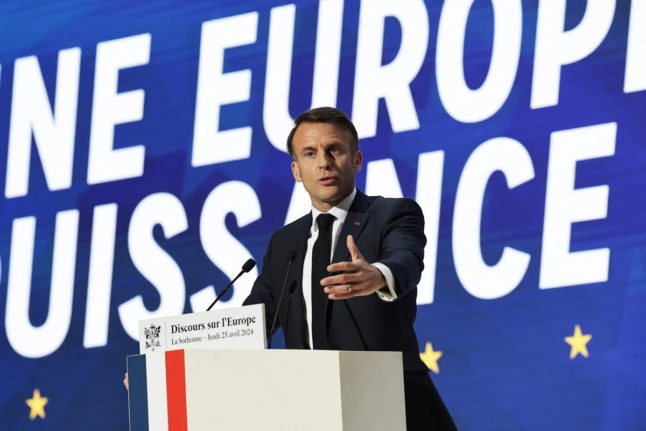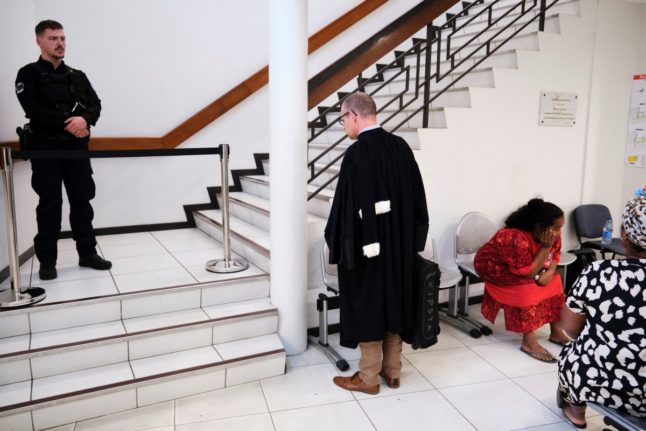European elections in France have a habit of defying pollsters and pundits. President Emmanuel Macron hopes that he can still rescue a mild defeat from the jaws of calamity when roughly half the French electorate turns out on Sunday.
He evidently hopes that the 80th anniversary D-Day commemorations on Thursday and his appearance on the TF1 TV on Thursday night can still convince thousands of disaffected, moderate citizens to vote for his camp – or at least to vote against the Far Right.
Macron is reported to be furious at the limp campaign run by his lead candidate, Valérie Hayer, and the unwillingness of some of his centrist barons to throw themselves into a losing battle.
If so, he is missing the point.
The miscast Hayer has run a poor European campaign but the fault is not hers alone. Some leading figures in Macronworld have been absent without leave. The government’s line has been inconsistent and confused.
But none of that explains why Marine Le Pen’s tailor’s dummy of a candidate, Jordan Bardella, is running away with the election. The central issue in the campaign is Emmanuel Macron himself.
The President’s camp has attempted to impose other subjects without success. They have tried to make the European election a referendum on the Ukraine war or the survival of the European Union or the rag-bag of destructive policies proposed by Le Pen and Bardella.
Nothing has worked. A large part of the French electorate is determined – rightly or wrongly – to deliver a kicking to President Macron after seven years in power.
Opposition leaders complain that the D-Day events and the President’s TV appearance will give the Macron camp an unfair advantage in the final straight of the campaign. Do they really believe that?
Macron’s clever young Prime Minister, Gabriel Attal, wiped the floor with Bardella in their one-on-one TV debate last month. Since then, Bardella’s lead in the daily IFOP tracking poll for Le Figaro has increased from 16 points to 18 points.
A large chunk of the electorate is immune to argument or persuasion. They see the European election as a risk-free chance to punish Macron for his broken promises (such as the increase in French debt) but also for his kept promises (such as pension reform).
Three other factors are in play. Firstly, there is France’s perennial hatred of incumbents. Secondly, there is the exaggerated, Europe-wide, media and Far Right-led psychosis about migration and crime. Thirdly, there is a Brexit-like ignorance of the achievements of the European Union and magnification of its mistakes and failures.
The margin of Far Right victory over Macron’s camp may be less than 18 points on Sunday. Marine Le Pen, unlike her father, often performs better in polls than at the ballot box.
It seems inevitable, all the same, that there will be a crushing disavowal of Macron – not of Valérie Hayer, not of Gabriel Attal, but of Macron.
What does the President do then?
He has three years of his second and final mandate to run. He has no overall majority in the National Assembly. The last, and most vital, challenge of Macron’s political career will be to try to prevent France from replacing him with Le Pen in 2027.
One possibility would be to turn Right and expand his centrist alliance into a coalition with what remains of the ex-Gaullist centre-right, Les Républicains. There have been rumours that Macron may dump Attal, 35, after only five months, and replace him with the 74-year-old President of the Senate, Gérard Larcher.
In other words, France would stumble from the youngest PM of the Fifth Republic to the oldest.
That is highly unlikely.
Larcher says that he would not serve under Macron and Macron would not want to share power. The much divided and untrustworthy Les Républicains would make terrible coalition partners. With Larcher as PM, the Macron camp might lose many of its left-leaning deputies and end up still short of a majority.
Instead, there could be a reshuffle of the present government to bring in a few high-profile names. But who? Macron has tried that before, without much success.
More likely, Macron will tough it out until the Autumn. He will hope that the country, having delivered its kicking, will turn its attention to the European football championship and the Paris Olympics.
The political reckoning cannot be delayed beyond, say, October. The centre-right refused to vote for two censure motions against Attal’s government this week but threaten to bring one of their own when the National Assembly reconvenes after the summer break.
That might succeed in bringing down the government (something that has only happened once before in the 60-odd years of the Fifth Republic).
Macron would then face a series of bad choices. He could reappoint Attal and invite serial censure motions. He could look for another PM more acceptable to the centre right. Or he could dissolve parliament and call an early parliamentary election.
My guess is that there will be a National Assembly election before the end of the year.
If so, Marine Le Pen will do distressingly well but will not win enough seats to form a government. The Left will fail to renew the NUPES pan-Left alliance, which would help both the Macron camp and Le Pen. The new assembly might be even more splintered than the present one.
The likelihood is that one mess will give way to a bigger mess.
All the same, I believe that Macron will be tempted – or forced – to put an existential question to the French people long before the presidential election in 2027. Do you really want to be governed by Le Pen and Bardella?



 Please whitelist us to continue reading.
Please whitelist us to continue reading.
Member comments